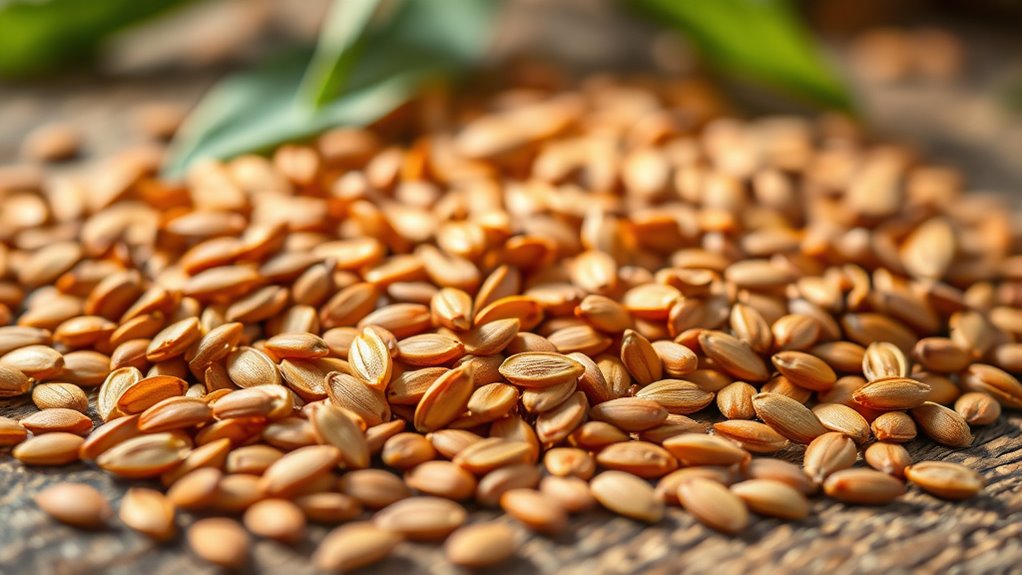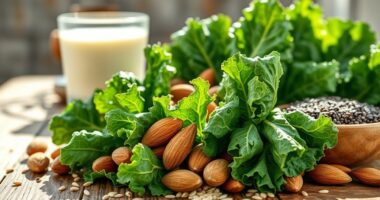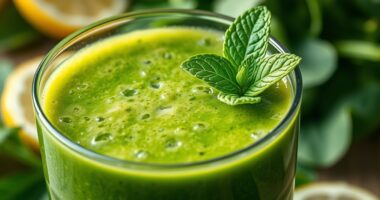Recent studies show that plant-based omega-3 sources like flaxseed and chia offer health benefits, but they mainly provide ALA, which your body converts to EPA and DHA at low rates. Fish oil naturally supplies these directly, making it more efficient. However, with consistent intake and fortified plant options, you can still support heart and brain health. If you want to discover how effective plant sources really are compared to fish oil, keep exploring the latest findings.
Key Takeaways
- Plant sources like flax provide ALA, which converts to EPA/DHA at low efficiency compared to fish oil.
- Recent meta-analyses show plant-based omega-3s can reduce inflammation and support heart health similarly with consistent intake.
- Fortified plant products with algae oil help bridge the EPA/DHA gap, enhancing their effectiveness.
- Individual factors like genetics and diet influence ALA conversion rates, affecting overall omega-3 benefits.
- Regular consumption of plant-based omega-3s offers a sustainable, effective alternative to fish oil for many health markers.

If you’re looking to boost your omega-3 intake without relying on fish or supplements, plant-based sources offer a healthy and sustainable alternative. While fish oil has long been recognized as a rich source of omega-3 fatty acids, especially EPA and DHA, many people seek plant-based options due to dietary preferences, allergies, or environmental concerns. Recent research, including an extensive meta-analysis, compares the effectiveness of plant-based omega-3 sources—like flaxseed, chia seeds, and walnuts—to traditional fish oil supplements. This analysis aims to clarify whether plant-based options can truly match the benefits of fish oil, helping you make informed dietary choices.
The latest meta-analysis examined multiple studies that measured the impact of various omega 3 sources on health markers such as inflammation, blood lipid levels, and cognitive function. It found that flaxseed and other plant-derived sources primarily contain alpha-linolenic acid (ALA), a type of omega-3 fatty acid that the body can convert into EPA and DHA, albeit at a relatively low efficiency. Fish oil, on the other hand, provides direct sources of EPA and DHA, which are more readily utilized by your body. Despite this difference, the analysis revealed that, with consistent intake, plant-based omega-3s can offer comparable health benefits—particularly in reducing inflammation and supporting heart health.
However, the conversion rate of ALA to EPA and DHA varies markedly among individuals, influenced by genetics, overall diet, and health status. This means that simply adding flaxseeds or walnuts might not deliver the same levels of EPA and DHA as fish oil unless you consume large quantities regularly. That’s where the latest research provides reassurance: for many people, including those who don’t eat fish, a well-planned plant-based diet rich in omega 3 sources can still contribute meaningfully to their omega-3 needs. It’s also worth noting that some plant-based products are now fortified or formulated with algae oil, which contains EPA and DHA directly, bridging the gap between plant sources and fish oil.
Frequently Asked Questions
How Does Flaxseed’s Omega-3 Compare to Fish Oil in Absorption?
You might wonder about absorption efficiency and bioavailability comparison between flaxseed and fish oil omega-3s. Flaxseed contains ALA, which your body converts to EPA and DHA less efficiently, making its absorption slightly lower. Fish oil provides preformed EPA and DHA, leading to better bioavailability. So, while flaxseed is a healthy plant-based option, fish oil generally offers superior absorption efficiency for omega-3s.
Are There Any Side Effects of Consuming Large Amounts of Flaxseed?
When you consume large amounts of flaxseed, you might experience issues with flaxseed digestion, such as bloating or stomach discomfort. While flaxseed is rich in omega-3, an omega 3 overdose can lead to blood thinning or digestive upset. It’s best to moderate your intake, listen to your body, and consult a healthcare professional if you notice adverse effects, ensuring you enjoy health benefits without risks.
Can Vegans Meet Their Omega-3 Needs Without Fish or Supplements?
You can meet your omega-3 needs without fish or supplements by exploring fish alternatives rich in plant omega-3s. Flaxseeds are a great source, providing alpha-linolenic acid (ALA), which your body can convert to EPA and DHA. Other options include chia seeds, walnuts, and algae oils. Incorporating these into your diet helps guarantee adequate omega-3 intake, supporting your health without relying on fish or supplements.
How Sustainable Is Flax Farming Compared to Fishing?
When comparing flax farming to fishing, flax is generally more sustainable. You avoid aquaculture impacts like habitat destruction and pollution linked to fish farms. Flax cultivation benefits from crop rotation, reducing soil depletion and pesticide use. Plus, it requires less water and energy than fishing. So, by choosing flax, you support a farming method that’s better for the environment and helps preserve aquatic ecosystems.
Does Flaxseed Provide Other Health Benefits Beyond Omega-3?
You’ll find that flaxseed offers more than just omega-3s. It’s rich in dietary fiber, which supports digestion and helps regulate blood sugar. Flaxseed also provides alternative antioxidants that protect your cells from damage and boost your immune system. Incorporating flax into your diet can improve overall health, thanks to these additional benefits that go beyond omega-3 content, making it a versatile and nutritious choice.
Conclusion
So, as you explore plant-based omega-3 options like flax, remember you’re planting seeds for your health’s future. This latest meta-analysis shows that flax can truly hold its own against fish, proving that you don’t have to fish for health benefits—nature’s treasures are already within your reach. Embrace these plant powerhouses and let them be the guiding light on your journey to wellness, nourishing your body like a gentle rain nourishing the earth.










